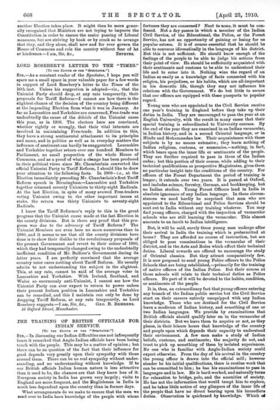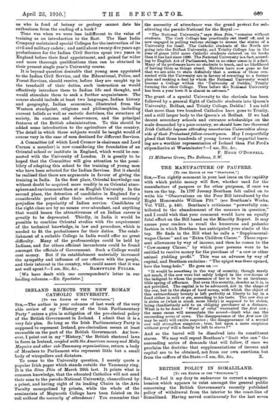£HE TRAINING OF BRITISH OFFICIALS FOR INDIAN SERVICE.
ITO THE EDITOR 07 THE " SPECTATOR.1
SIR,—In discussing our Indian difficulties one not infrequently hears it remarked that Anglo-Indian officials have been losing touch with the people. This may be a matter of opinion ; but there can be no question of the fact that their influence for good depends very greatly upon their sympathy with those around them. There can be no real sympathy without under- standing, and no understanding without knowledge. If to our British officials Indian human nature is less attractive than it used to be, the chances are that they know less of it. European society in India has grown very largely ; visits to England are more frequent, and the Englishman in India is much less dependent upon the country than in former days.
What arrangements do we make to ensure that the men we send over to India have knowledge of the people with whose fortunes they are concerned P Next to none, it must be con- fessed. Not a day passes in which a member of the Indian Civil Service, of the Educational, the Police, or the Forest Service, has not an opportunity of gaining or losing for us popular esteem. It is of course essential that he should be able to converse idiomatically in the language of his district. But this is not sufficient. He should know enough of the feelings of the people to be able to judge his actions from their point of view. He should be sufficiently acquainted with their sentiments and customs to be able to understand their life and to enter into it. Nothing wins the regard of an Indian so easily as a knowledge of facts connected with his religion, his prejudices, or his habits, which are all-important in his domestic life, though they may not influence his relations with the Government. We do but little to secure that our officers are equipped with these passports to popular regard.
Young men who are appointed to the Civil Service receive one year's training in England before they take up their duties in India. They are encouraged to pass the year at an English University, with the result in many cases that their special training is subordinated to University courses. By the end of the year they are examined in an Indian vernacular, in Indian history, and in a second Oriental language, or in Hindu and Mohammedan law. Their acquaintance with these subjects is by no means extensive ; they learn nothing of Indian religions, customs, or economics,—nothing, in fact, which bears upon the inner life or sentiments of the people. They are further required to pass in three of the Indian codes ; but this portion of their coarse, while adding to their technical qualifications as prospective Magistrates, gives them no particular insight into the conditions of the country. For officers of the Forest Department the period of training is longer; it extends over two years. It is passed at Oxford, and includes science, forestry, German, and bookkeeping, but no Indian studies. Young Forest Officers land in India in absolute ignorance of any Indian language. In these circum- stances we need hardly be surprised that men who are appointed to the Educational and Police Services should be sent out to India without any training whatever. You may find young officers, charged with the inspection of vernacular schools who are still learning the vernacular. This almost amounts to an insult to Indian intelligence.
But, it will be said, surely these young men undergo after their arrival in India the training which is pretermitted at home ? They are afforded no course of instruction, but are obliged to pass examinations in the vernacular of their district, and in the Acts and Rules which affect their technical duties. Liberal rewards are offered to encourage the study of Oriental classics. But they attract comparatively few. It is now proposed to send young Police officers to the Police Schools that are being established,—primarily for the training of native officers of the Indian Police. But their course at these schools will relate to their technical duties as Police officers. No part of it will be devoted to the habits, condition, or sentiments of the people.
It is, then, an extraordinary fact that young officers entering any branch of the Indian public service but the Civil Service start on their careers entirely unequipped with any Indian knowledge. Those who are destined for the Civil Service learn a modicum of Indian history, and something of one or two Indian languages. We provide by examinations that British officials should qualify later on in the vernacular of their districts. But we leave them to acquire or not, as they please, in their leisure hours that knowledge of the country and people upon which depends their capacity to understand their environment. A few men make a study of Indian beliefs, customs, and sentiments ; the majority do not, and trust to pick up something of them by isolated experiences. No one who is familiar with Anglo-Indian society could expect otherwise. From the day of his arrival in the country the young officer is drawn into the official mill ; however slender be his initial qualifications, there is routine work that can be committed to him ; he has his examinations to pass in languages and in law. He is hard-worked, and naturally turns for relaxation to bridge, polo, and the amenities of society. He has not the information that would tempt him to explore, and he takes little notice of any glimpses of the inner life of the people that have no direct bearing upon his immediate duties. Observation is quickened by knowledge. Which ed
us who is fond of botany or geology cannot date his enthusiasm from the reading of a book ?
Time was when we were less indifferent to the value of training as an introduction to the East. The East India Company maintained special Colleges for the instruction of its civil and military cadets ; and until about twenty-five years ago probationers for the Indian Civil Service spent two years in England before their final appointment, and gained far wider and more thorough qualifications than can be obtained in their present single year's University course.
It is beyond question desirable that young men appointed to the Indian Civil Service, and the Educational, Police, and Forest Services, should receive, before they are caught up in the treadmill of their duties, such instruction as would effectively introduce them to Indian life and thought, and would stimulate them to seek a further acquaintance. The course should include at least two languages, Indian history and geography, Indian economics, illustrated from the Western standpoint, religions and philosophies, including current beliefs as well as esoteric doctrines, the structure of society, its customs and observances, and the principal features of the British administration. To this should be added some introduction to the agriculture of the country. The detail in which these subjects would be taught would of course vary in the case of men destined for different Services.
A Committee (of which Lord Cromer is chairman and Lord Curzon a member) is now considering the foundation of an Oriental school or institute in England, which would be con- nected with the University of London. It is greatly to be hoped that the Committee will give attention to the possi- bility of adapting this school to the training of young men who have been selected for the Indian Services. But it should be realised that there are arguments in favour of giving the training in India. In the first place, Oriental knowledge can without doubt be acquired more readily in an Oriental atmo- sphere and environment than at an English University. In the second place, the detention of candidates in England for a considerable period after their selection would seriously prejudice the popularity of Indian service. Candidates of the right class are by no means over-abundant, and anything that would lessen the attractiveness of an Indian career is greatly to be deprecated. Thirdly, in India it would be possible to combine Oriental studies with the acquirement of the technical knowledge, in law and procedure, which is needed to fit the probationers for their duties. The estab- lishment of a suitable College in India would offer no great .difficulty. Many of the professorships could be held by Indians, and for others efficient incumbents could be found amongst the officials of Government. Such a College would cost money. But if its establishment materially increased the sympathy and influence of our officers with the people, and their interest in the country, who could assert that it was
not well spent ?—I am, Sir, &c., BAMPFYLDE FULLER. [We have dealt with our correspondent's letter in our leading columns.—En. Spectator.]















































 Previous page
Previous page